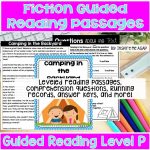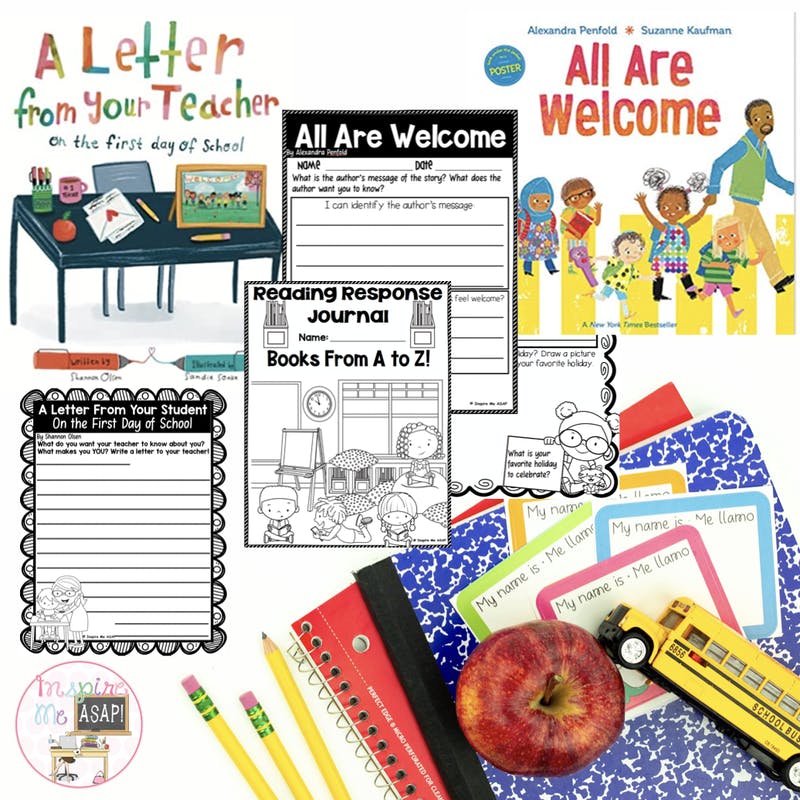$7.65
Landforms Unit includes:
1. Polaroid bulletin board: A bulletin board idea with polaroids of the featured landforms (Pages 4-18)
2. Water/land formations categorization: Black and white clip art images for students to color and categorize water and land formations (pages 19-27)
3. Anchor charts: Beautiful, real photographs of all the featured landforms, with the definition of each landform, for you to refer to throughout the unit (pages 28 – 51)
4. Junior explorer certification passport: As your students learn about each of the different landforms, they use their passport to document their learning, eventually earning official explorer status. (Pages 52-77)
5. Lovin’ landforms acrostic poems packet: Students read various non-fiction texts about the landforms, identify the most important ideas, and write an acrostic poem by supporting their answer with ideas from the text. (Pages 78-107)
6. Facts and opinions with landforms: Students identify important facts about specific landforms, referring to the text to support their ideas, and write their opinion. (Pages 108-110)
7. Opinion writing: Students express their opinion about their favorite landform and support their opinion with reasons. (Pages 111-117)
8. Culminating painting project: Students celebrate the end of the landform unit by paining a landform and identifying specific adjectives that describe the landform. (Pages 118-135)
**Please download the file preview!!!***
Anchor Standards Addressed:
CCSS.ELA-Literacy.CCRA.R.1 Read closely to determine what the text says explicitly and to make logical inferences from it; cite specific textual evidence when writing or speaking to support conclusions drawn from the text.
CCSS.ELA-Literacy.CCRA.R.2 Determine central ideas or themes of a text and analyze their development; summarize the key supporting details and ideas.
CCSS.ELA-Literacy.CCRA.R.9 Analyze how two or more texts address similar themes or topics in order to build knowledge or to compare the approaches the authors take.
CCSS.ELA-Literacy.CCRA.R.10 Read and comprehend complex literary and informational texts independently and proficiently.
CCSS.ELA-Literacy.W.2.7 Participate in shared research and writing projects (e.g., read a number of books on a single topic to produce a report; record science observations).
CCSS.ELA-Literacy.W.2.8 Recall information from experiences or gather information from provided sources to answer a question.
CCSS.ELA-Literacy.W.3.7 Conduct short research projects that build knowledge about a topic.
CCSS.ELA-Literacy.W.3.8 Recall information from experiences or gather information from print and digital sources; take brief notes on sources and sort evidence into provided categories
CCSS.ELA-Literacy.W.4.7 Conduct short research projects that build knowledge through investigation of different aspects of a topic.
CCSS.ELA-Literacy.W.4.8 Recall relevant information from experiences or gather relevant information from print and digital sources; take notes and categorize information, and provide a list of sources.
CCSS.ELA-Literacy.W.4.9 Draw evidence from literary or informational texts to support analysis, reflection, and research.
2.W.1. Write opinion pieces in which they introduce the topic or book they are writing about, state an opinion, supply reasons that support the opinion, use linking words (e.g., because, and, also) to connect opinion and reasons, and provide a concluding statement or section.
2.W.7. Participate in shared research and writing projects (e.g., read a number of books on a single topic to produce a report; record science observations).
2.W.8. Recall information from experiences or gather information from provided sources to answer a question.
3.W.1. Write opinion pieces on topics or texts, supporting a point of view with reasons. 3.W.8. Recall information from experiences or gather information from print and digital sources; take brief notes on sources and sort evidence into provided categories.
4.W.1. Write opinion pieces on topics or texts, supporting a point of view with reasons and information. 4.W.7. Conduct short research projects that build knowledge through investigation of different aspects of a topic. 4.W.8. Recall relevant information from experiences or gather relevant information from print and digital sources; take notes and categorize information, and provide a list of sources. 4.W.9. Draw evidence from literary or informational texts to support analysis, reflection, and research.
If you have any questions, please email me prior to purchasing! :)





Get instant LIFETIME access to hundreds of passages for all levels! These reading passages will create a high level of engagement for your readers and are perfect for their reading level.

Creating a classroom community of engaged and independent readers starts from day one of the school year! I created 26 different graphic organizers and a free reading response journal to inspire your readers!
Each graphic organizer correlates to a story that promotes inclusion, kindness, and empathy! Download today for free!